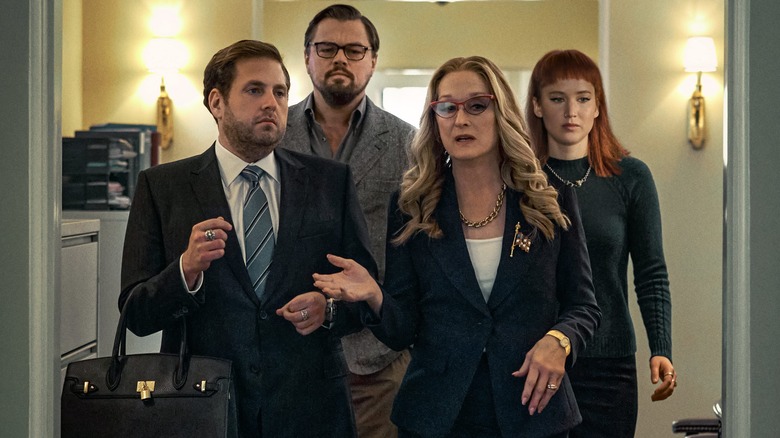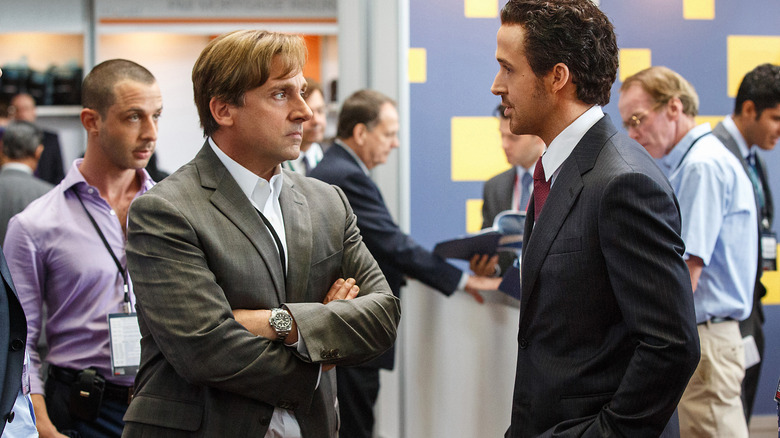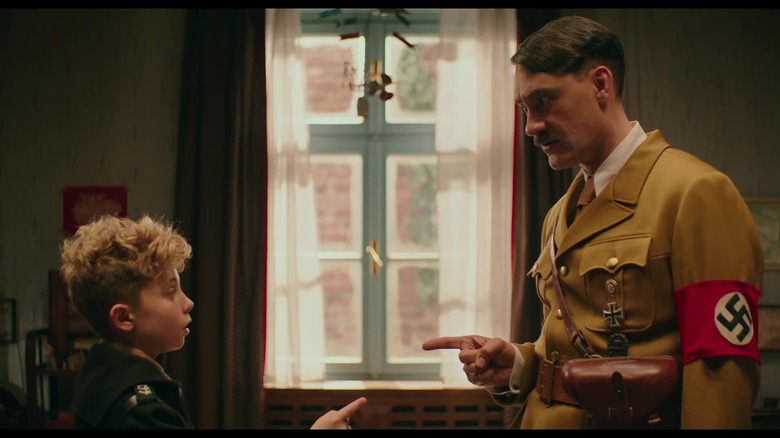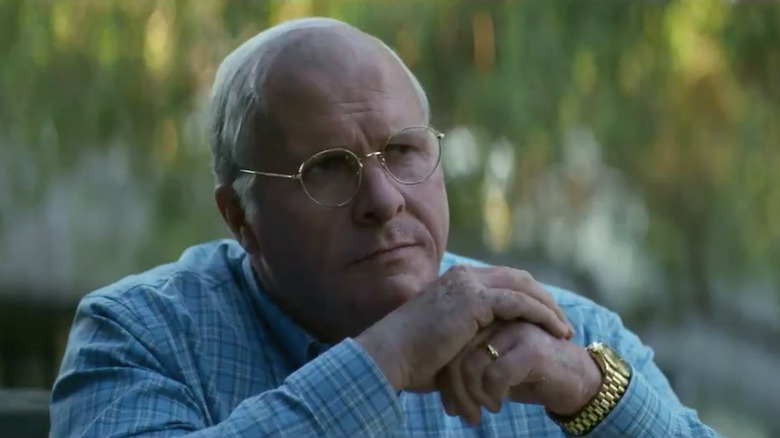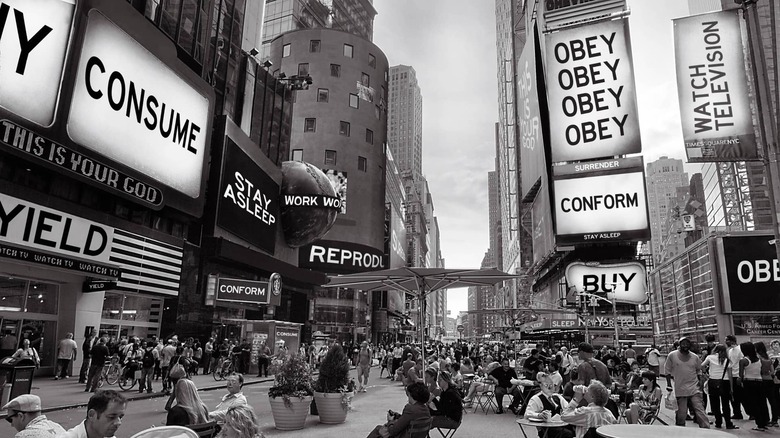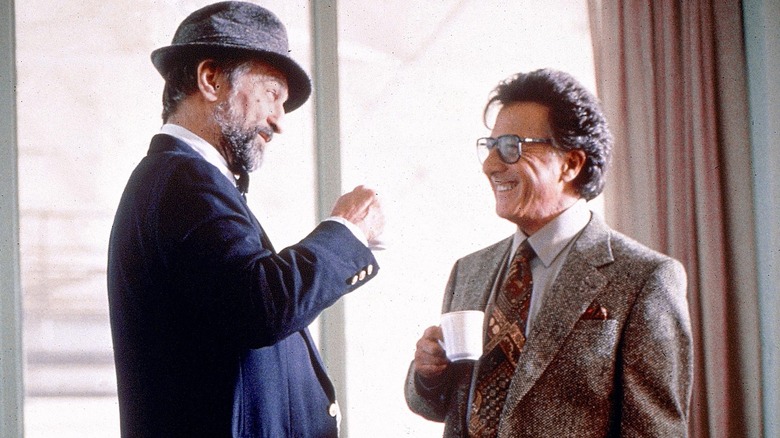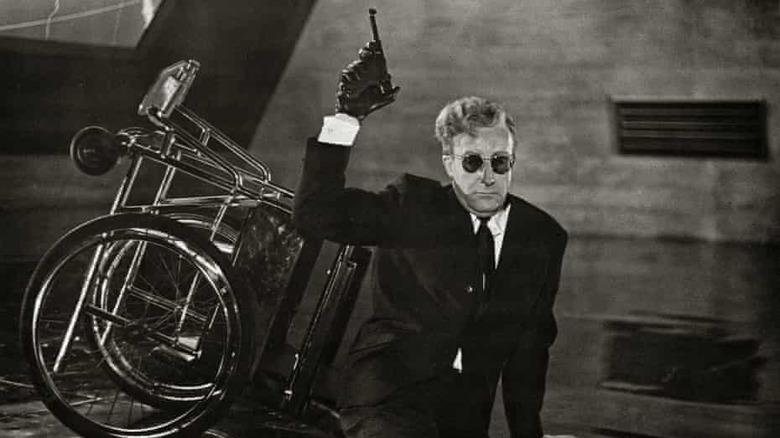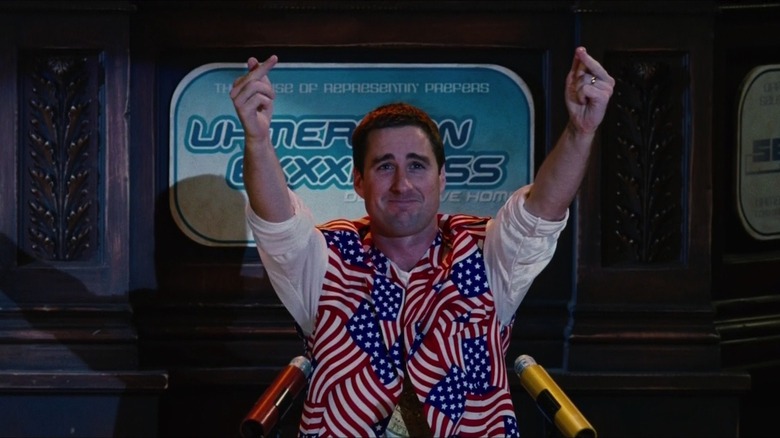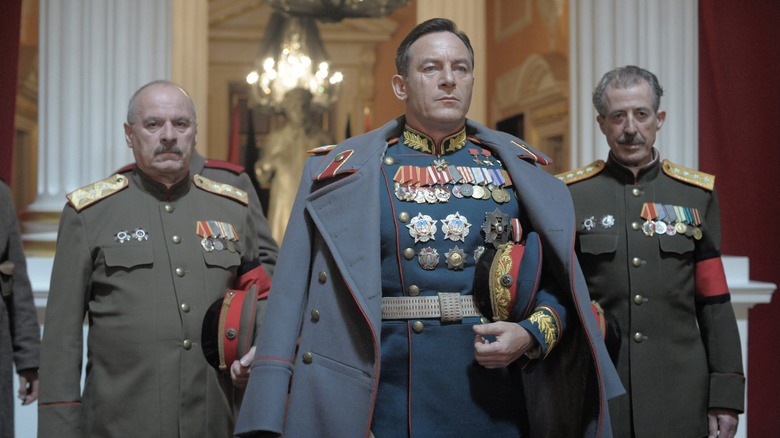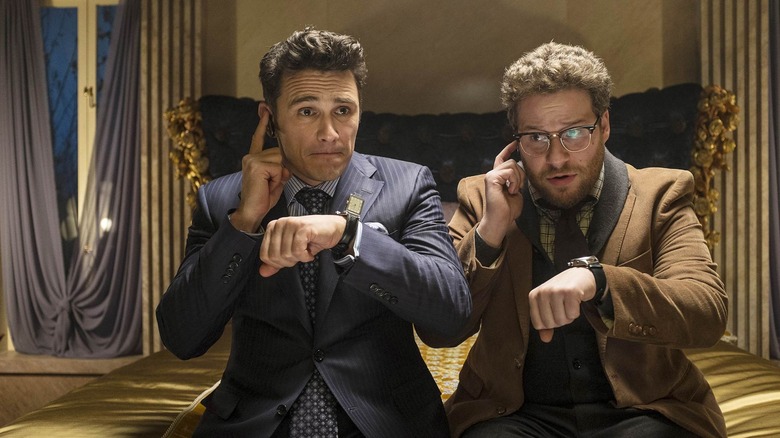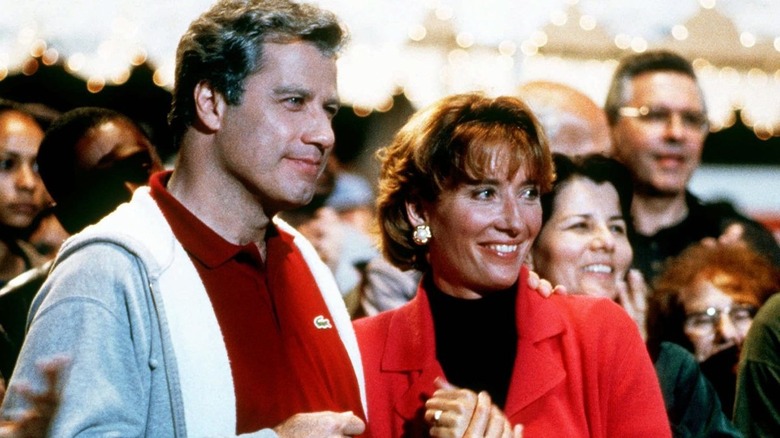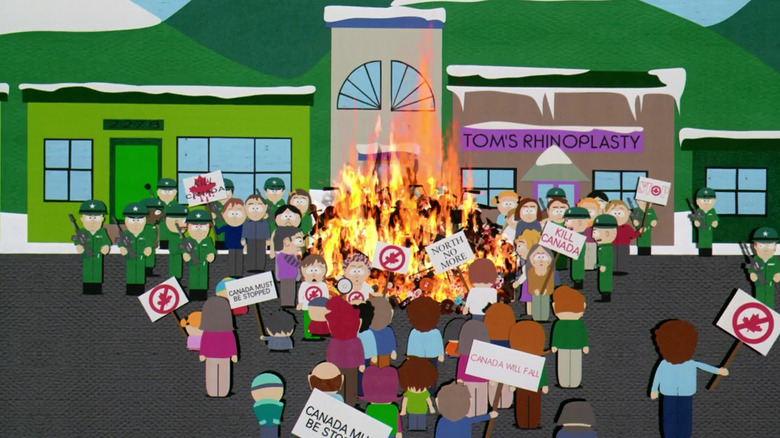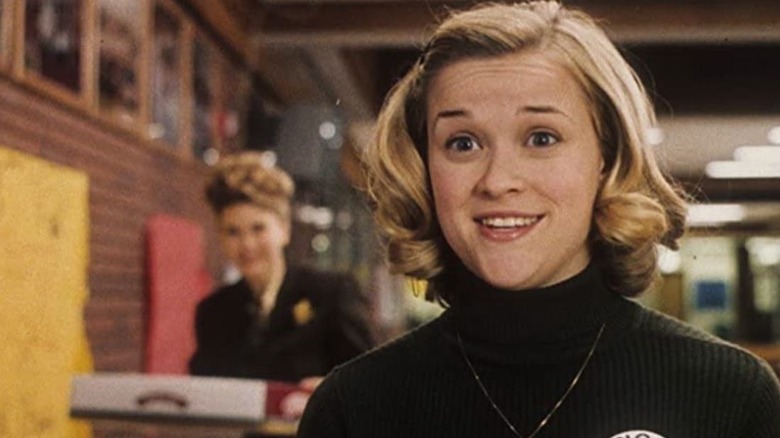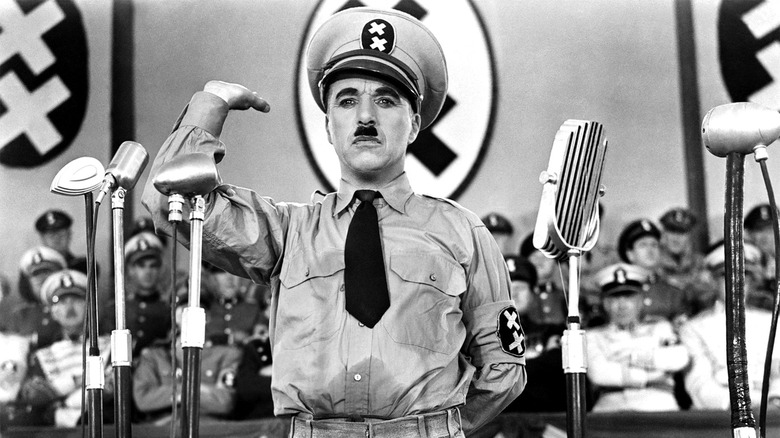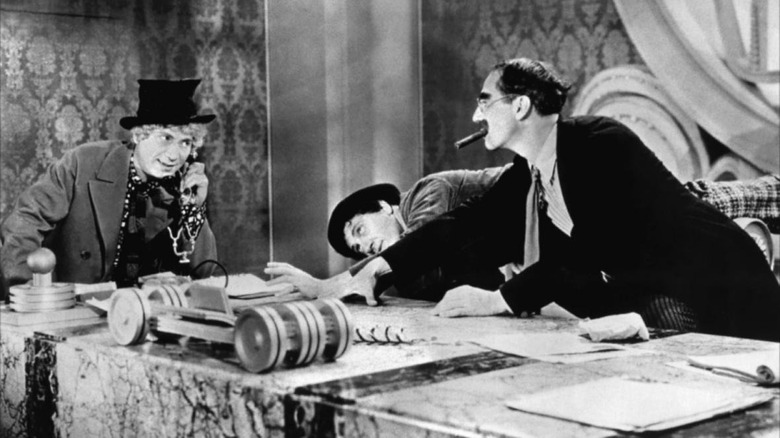Movies Like Don't Look Up That You Should Stream Right Now
Released in December, Adam McKay's "Don't Look Up" quickly became one of the most divisive movies of 2021. Reviews have been split down the middle, with some critics enjoying how McKay satirizes American ignorance and others finding it pandering and unfunny. The mixed response certainly hasn't pulled any attention away from McKay's latest: "Don't Look Up" received four Academy Award nominations, and has become one of the biggest films in Netflix history.
"Don't Look Up" tells the story of an impending asteroid strike that could potentially wipe out all life on Earth. Michigan State University's Dr. Randall Mindy (Leonardo DiCaprio) and doctoral candidate Kate Dibiasky (Jennifer Lawrence) discover the impending crisis, and inform the White House of President Janie Orlean (Meryl Streep). Despite their pleas to put a plan into action, Orlean and her son, Jason (Jonah Hill), refuse to do anything.
"Don't Look Up" has a very dark sense of humor. The ignorance of politicians is scary if you consider the events of the past two years. Even if it wasn't intended to be, "Don't Look Up" is as a disturbing parallel to the COVID-19 crisis. McKay has actively criticized climate change deniers during the press rounds for the film, and it's easy to see "Don't Look Up" as pessimistic. However, seeing scientists work to keep people informed is very inspirational.
It's an interesting film to debate whether you love it or hate it. If you're one of the ones that loved it, you should stream these other films.
The Big Short
For many years, Adam McKay's directorial efforts were collaborations with Will Ferrell, comedies that followed a certain template that worked well with Ferrell's comic sensibilities. In his first film without Ferrell in the lead, McKay took on a much different type of story. He chose to adapt Michael Lewis' novel "The Big Short," which explores the decisions that led to the 2008 financial crisis and the crash of the housing market. The film follows the analyst Michael Burry (Christian Bale), who discovers that the entire housing market is doomed to fail. Burry's hedge fund catches the attention of the salesman Jared Vennett (Ryan Gosling).
Vennett approaches an independent trader, Mark Baum (Steve Carrell), and attempts to convince him that Burry is right. Baum is notoriously critical of the corruption within prominent American banks, and decides to work with Vennett to look into Burry's theory. They discover that the trail of fraud runs much deeper than anyone realized.
McKay uses fast-paced humor to make the complex subject material easier to understand. Cameos from celebrities like Anthony Bourdain, Margot Robbie, and Selena Gomez break the fourth wall to explain how the "shorting" process works. Some characters even address the audience directly and tell them what aspects of the film are inaccurate.
Like "Don't Look Up," "The Big Short" is very bleak. Baum's realization that the media will blame "immigrants and poor people" for the crisis is ends the film on a heartbreaking final note.
Jojo Rabbit
"Don't Look Up" risked being disrespectful with its comedic slant on serious political issues. The divisive response indicates that not all critics and fans thought McKay pulled this off, but a lot of viewers enjoyed his satirical activism. Comedies that try to discuss critical topics like "Don't Look Up" aren't always effective, but Taika Waititi's World War II coming-of-age effort "Jojo Rabbit" is one of the best recent examples. Waititi showed how fascism begins with children learning to be intolerant before telling an inspirational story of a devoted child who learns to set aside all the hateful speech he's surrounded by.
Johannes Betzler (Roman Griffin Davis), nicknamed "Jojo," is 10 years old and absolutely loves Adolf Hitler. Jojo lives in Nazi Germany with his mother Rosie (Scarlett Johansson). He is part of the Hitler Youth program, and wants to fight for the Nazi Party against the Allies. Unfortunately, Jojo's fellow trainees laugh at his meek behavior. He finds inspiration in his imaginary friend — who in this case happens to be Adolf Hitler, leader of the fascist political party he so admires.
What Jojo doesn't know is that his mother is a secret defector. She has housed a runaway Jewish girl named Elsa Korr (Thomasin McKenzie), who has remained hidden in their attic for some time. Jojo discovers that everything he's been taught about Jews by the Nazis is wrong. He is enchanted by the older girl — she's far from the monster than he expected.
Vice
"The Big Short" proved that McKay was capable of tackling controversial topics from recent American history. He continued his blackly comical approach with "Vice," a biopic of the former U.S. Vice President, Dick Cheney, played here by Christian Bale in a transformative performance. The former Batman is nearly unrecognizable — he gained significant weight and wore extensive prosthetics to capture Cheney's essence.
McKay explored how the decisions that were made during Cheney's tenure in office continue to have ramifications today. He identifies his wife Lynne (Amy Adams) as the Lady Macbeth type who plotted his path to success; her influence is shown during the opening scenes, when Cheney is relatively unambitious and nearly goes to jail for drunk driving. Lynne (Amy Adams) is infuriated but sees his potential, and manages to land him a job at the White House.
During his internship in the Nixon Administration, Cheney finds a mentor in Donald Rumsfeld (Steve Carrell), the future United States Secretary of Defense under Presidents Gerald Ford and George Bush. Rumsfeld convinces Cheney to join the Republican Party, and their radical ideas gain them an audience with many prominent politicians.
McKay also focuses on his manipulation of George W. Bush (Sam Rockwell). Rockwell doesn't depict Bush as the sharpest knife in the drawer, and it's easy to see how he'd be swayed by Cheney's deceptions. McKay makes it clear that Cheney didn't just expand the power of the executive branch – he became the most powerful "Vice" in American history.
They Live
A film doesn't need to be subtle to be effective. "Don't Look Up" tackles the serious issue of climate change, and shows how scientists are ignored by the masses. Regardless of whether or not the story feels realistic, it's infuriating to watch "Don't Look Up" and think that there are people that will refuse to acknowledge the facts, even when the fate of the entire planet is at stake. McKay makes that frustration palpable by creating characters and events that parallel recent news stories.
The great horror master John Carpenter incorporated similar elements of satire within many of his films. None of them were as overt as the 1988 science fiction thriller "They Live," which satirizes the all-encompassing power of capitalism. Carpenter used a clever metaphor to show how deceptive advertising creates a false freedom of choice. In the world of "They Live," an alien race has secretly infected society. These secret rulers use advertising to keep humans under control, and only special sunglasses can reveal their infiltration.
A pair of these sunglasses fall into the hands of the homeless traveler George Nada (Roddy Piper), who is searching for work in the slums of Los Angeles. Nada first learns about the aliens after watching a television broadcast that is disrupted by an activist. The transmission claims that the aliens can be defeated if their power source is destroyed. Nada realizes that the aliens have infiltrated every level of society — the sunglasses reveal that skull-faced creatures are seamlessly disguised as humans.
Wag the Dog
"Don't Look Up" satirizes the incompetence of the White House. Meryl Streep's President Orlean could not care any less if her citizens' lives are in danger. She's willing to risk the devastating consequences that the asteroid strike will have on the entire planet in order to satisfy her ego. Another film that explored the chaotic behind-the-scenes of the White House was Barry Levinson's 1997 dark comedy "Wag the Dog." Similar to McKay, Levinson combined wacky humor with truly disturbing moments that reflect the consequences of a careless President.
"Wag the Dog" imagines the ridiculous lengths that the president's staff have to go to in order to cover up his sexual affairs. It was ironically released the same year that the Clinton-Lewinsky scandal broke and dominated headlines. Robert De Niro stars as the spin doctor Conrad Brean, who is recruited by the president's administration to create an alternative narrative that can distract the public from the scandal. Brean enlists the help of a Hollywood producer, Stanley Moss (Dustin Hoffman), to create a plausible hoax.
Brean and Moss decide the is only thing more newsworthy than sex is war. They create a fictional crisis in Albania, and spread fabricated news footage of orphaned children in order to capture public sympathy for U.S. intervention. Viewers are convinced, but Brean and Moss realize that in order to continue their false crisis, they'll need a hero that people can invest in.
Dr. Strangelove or: How I Learned to Stop Worrying and Love the Bomb
"Don't Look Up" feels very timely because of the obvious parallels with recent political figures and events. It's fairly clear that President Orlean resembles Donald Trump due to her inflammatory rhetoric and inaction over environmental issues. It's a film that addresses the moment, and older films that were similarly timely during their release serve as great time capsules. Stanley Kubrick's 1964 classic "Dr. Strangelove or: How I Learned to Stop Worrying and Love the Bomb" addressed Cold War nuclear anxieties in the aftermath of the Cuban Missile Crisis. Similar to "Don't Look Up," "Dr. Strangelove" is equally hilarious and terrifying.
"Dr. Strangelove" features one of the greatest comedic performances of all time from Peter Sellers, who plays three different characters in the film. Sellers stars as the incompetent President of the United States Matt Merkin, the aggressive British RAF Captain Lionel Mandrake, and the titular unhinged nuclear extremist Dr. Strangelove. It's amazing to see Sellers interact with himself; the President confers with Dr. Strangelove on military issues, even though he's a former Nazi.
Mandrake is ordered by the United States Air Force Brigadier General Jack D. Ripper (Sterling Hayden) to prepare the American forces for a potential strike from the Soviet Union. Ripper talks about his unfounded conspiracy theories that the Russians are secretly poisoning American citizens. He advises the Chairman of the Joint Chiefs of Staff, General Buck Turgidson (George C. Scott), to launch an initial nuclear strike, and ... well, you'll just have to see what happens.
Idiocracy
"Don't Look Up" comes to the heartbreaking conclusion that in the face of an apocalyptic event, people choose to act like idiots. While McKay certainly gets a lot of laughs proving science deniers wrong, he doesn't treat society's willful ignorance as a joke. Mike Judge explored similar themes with his 2006 satire "Idiocracy." Similar to "Don't Look Up," "Idiocracy" uses science fiction elements to tackle current political themes.
The film stars a hero that literally couldn't be more ordinary if he tried. The kindly librarian Joe Bauers (Luke Wilson) is selected by the U.S. military as "the most average man on the planet" after a series of IQ tests. The armed forces leaders inform Joe that he will be sent forward in time by five centuries in order to investigate what the future is like. Joe wakes up in a dystopian society where the average IQ of the planet has rapidly decreased. The most intelligent people on the planet chose not to have children, and the former pornographic star and wrestler Dwayne Elizondo Mountain Dew Herbert Camacho (Terry Crews) is now the President of the United States.
The Death of Stalin
"Don't Look Up" is the latest in McKay's series of films centering around current hot button issues in American politics. McKay is unquestionably a very patriotic filmmaker who holds strong beliefs, and he's acknowledged that many viewers disagree with him. Armando Iannucci is another prominent satirist within the entertainment industry who has explored controversial issues. Iannucci has lampooned both the American and British leadership with his television shows "Veep," "The Thick of It," "I'm Alan Partridge," and his film "In the Loop."
However, with his dark comedy "The Death of Stalin," Iannucci looked at a critical moment in Russian political history. The film explores the scramble for power among the Soviet Union leaders in the immediate aftermath of the fearsome titular dictator's unexpected death. Stalin's committee members Nikita Khrushchev (Steve Buscemi), Vyacheslav Molotov (Michael Palin), Georgy Malenkov (Jeffrey Tambor), and Lavrenti Beria (Simon Russell Beale) squabble over how his last commands should be interpreted.
The Interview
"Don't Look Up" has been a controversial movie since it first began screening. It's the only best picture nominee at this year's Academy Awards that is certified as "rotten" on Rotten Tomatoes, and McKay's inflammatory comments have only intensified the discourse. Satirical films tend to provoke strong emotions, and no film in recent memory has been quite as controversial as the 2014 comedy "The Interview." The film was notoriously singled out by hackers during the cyber attack on Sony, and the wide theatrical release was canceled after a series of terrorist threats.
"The Interview" isn't exactly subtle in the political figures it is making fun of. James Franco and Seth Rogen star as the fictional television hosts Dave Skylark and Aaron Rapaport, respectively. Dave and Aaron interview celebrities and discuss gossip on their show "Skylark Tonight," and they discover that they have a surprising fan: North Korean dictator Kim Jong-un (Randall Park). A North Korean diplomat reaches out and requests that Dave and Aaron sit down for an interview with Kim himself.
Before they embark on their trip overseas, the pair is approached by the CIA Agent Lacey (Lizzy Caplan). Lacey informs them that the U.S. military is planning to secretly assassinate Kim Jong-un, and she wants the two of them to do it while they're in the country.
Primary Colors
It's not hard to see the parallels between President Orlean in "Don't Look Up" and former U.S. President Donald Trump, who was still in office during the film's writing and production process (worth mentioning: Jonah Hill is a particularly amusing caricature of Trump's son, Don Jr.). Satirical films can commentate on current political figures without naming them outright; the 1998 film "Primary Colors" examined the presidential campaign of a charismatic Southern Governor who was an obvious stand-in for Bill Clinton.
The Governor of Arkansas Jack Stanton (John Travolta) is close to securing the Democratic nomination for President of the United States. The idealistic civil rights advocate Henry Burton (Adrian Lester) joins Stanton's team, and he's instantly impressed by Stanton's charisma and grace ... and surprised to see how skeptical Stanton's wife Susan (Emma Thompson) and campaign manager Richard Jemmons (Billy Bob Thorton) are. Henry learns a hard truth about political campaigning — everyone is putting on a front. Beneath Stanton's seemingly empathetic persona are a series of affairs and controversies.
South Park: Bigger, Longer, and Uncut
One of the funniest moments in "Don't Look Up" is the surprising musical number "Just Look Up" featuring Ariana Grande's character Riley Bana. Bana is a famous pop superstar who joins Mindy and Kates' campaign to raise awareness about the impending asteroid strike. It's a very funny sequence, and the song is surprisingly strong on its own. Musical numbers can be effectively incorporated within satires, and there aren't many movie musicals that are funnier than 1999's "South Park: Bigger, Longer, and Uncut."
"South Park" creators Trey Parker and Matt Stone successfully transferred the sharp satire of the series into a compelling narrative that justified being in theaters. The story pokes fun at censorship; after Stan, Kyle, Cartman, and Kenny watch a crude Canadian comedy, the U.S. decides to declare war on their northern neighbor. Parker and Stone didn't put any less effort into the musical numbers, and all of the songs in "South Park: Bigger, Longer, and Uncut" are great on their own.
Election
Politicians behave like children, particularly the politicians in "Don't Look Up." Orlean and her administration silence their critics as a childhood bully would, and there's a lot of schoolyard name-calling between some of the high-ranking figures. What better way to show these similarities than look at the actual political campaigning that adolescents do? The 1999 satire "Election" explores a surprisingly fierce campaign cycle for the student body leader at a Nebraska high school.
Overachiever Tracey Flick (Reese Witherspoon) has prepared for this election for her entire life, and she goes over the top preparing her campaign speeches. Tracey's obnoxious nature infuriates civics teacher Jim McAllister (Matthew Broderick), and he's determined to prevent her from winning. Jim suggests to class jock Paul Metzler (Chris Klein) that he should also run; Paul has no desire to be a leader, but he's very popular. Paul is completely clueless, and Jim finds him easy to manipulate.
The Great Dictator
Those that complain that modern movies like "Don't Look Up" are "too political" may be shocked to learn that films have been discussing political issues since the Golden Age of Hollywood. One of the bravest films of the classic film era is Charlie Chaplin's 1940 classic "The Great Dictator." The film lampooned the rise of Adolf Hitler a full year before the United States entered World War II; like "Don't Look Up," it was eerily prophetic.
Chaplin delivers one of his greatest performances in two dual roles: a shy Jewish barber and the ruthless dictator Adenoid Hynkel. Hynkel has begun persecuting the Jewish communities, and the barber is forced to flee from his home. He disguises himself in a fascist military uniform in order to escape, but he's mistaken for Hynkel himself. Chaplin was best known for his silent films, but "The Great Dictator" was his first film to be complete with sound. The final monologue in which the barber rallies against fascism is one of the greatest speeches in film history.
Duck Soup
"Don't Look Up" features an extensive ensemble, and many of the actors are playing against type. It's amusing to see Leonardo DiCaprio as a nerdy scientist, Jennifer Lawrence as a shrill activist, Meryl Streep as an ignorant leader, and Timothee Chalamet as a goofy party hooligan. These are very different than the types of characters they would normally play. Satirical films require their casts to be dexterous, and the Marx brothers were able to diversify their characters throughout their filmography.
"Duck Soup" (1933) is the crowning achievement of the Marx brothers' career. It's their funniest film, but like "Don't Look Up" it lampoons the absurdity of politics. The threat of another world war was a divisive issue in the early 1930s, but the brothers were unafraid to make fun of the bickering between politicians. "Duck Soup" imagines how a rivalry between the leaders of the fictional countries Freedonia and Sylvania could spiral out of control.
